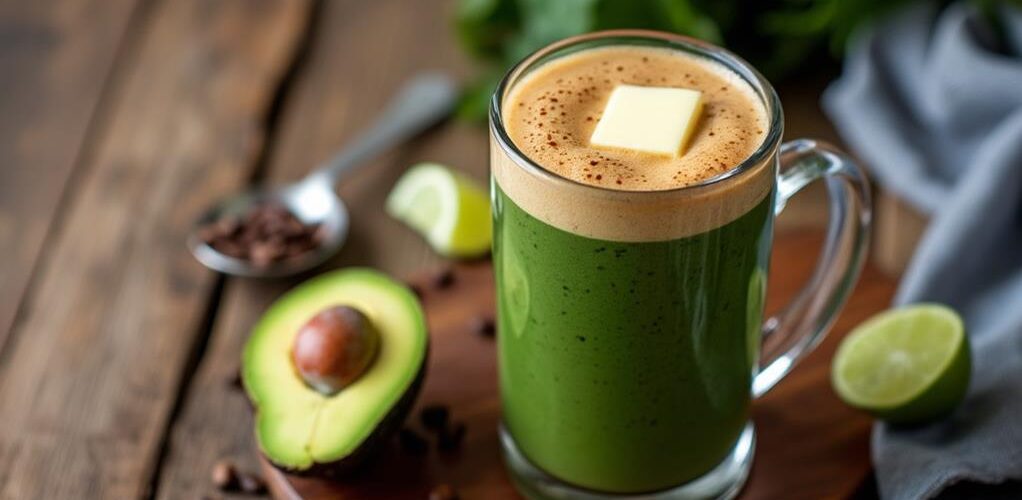
Maintaining ketosis requires careful drink choices. Ideal hydration can be achieved with water, which is calorie and carb-free. Black coffee and plain teas are excellent, providing antioxidants and minimal carbs. Adding heavy cream or unsweetened almond milk offers extra flavor without compromising ketosis. Sparkling water is another great option, especially for those seeking variety. Avoid sugary drinks and opt for keto-friendly sweeteners like stevia. Drinks to skip include regular sodas, fruit juices, and high-carb beer. Selecting appropriate beverages supports your keto goals and guarantees nutritional balance. Discover a range of beneficial options helping you stay on track.
Key Takeaways
- Water is the best choice for keto, being calorie-free, carb-free, and sugar-free.
- Black coffee, nearly carb-free, boosts metabolism and fat burning, fitting well with keto.
- Plain teas, like black, green, and herbal, offer low-carb hydration with added health benefits.
- Sparkling water is a calorie-free, carb-free alternative to sugary soft drinks for keto compliance.
- Avoid sugary sweeteners in drinks; opt for keto-approved options like stevia or erythritol.
Importance of Keto Hydration
Staying properly hydrated is fundamental on a keto diet due to the unique metabolic changes that occur with low carbohydrate intake. When glycogen stores deplete, the body sheds water weight, necessitating effective hydration strategies. This is essential not only for maintaining overall health but also for ensuring the diet's success.
One of the critical aspects to take into account is electrolyte balance. The shift to low-carb eating and the removal of processed foods can disrupt this balance, as many processed foods contain added sodium and other electrolytes. Consequently, increasing both water and electrolyte intake becomes important. Recommended daily water intake generally ranges from 8 to 10 cups, yet individual needs may vary based on factors like activity levels and climate.
Moreover, while high sodium intake can lead to water retention, managing electrolyte levels—particularly sodium, potassium, and magnesium—is essential. Proper hydration supports digestion and metabolic processes, which are necessary for maintaining energy levels and adhering to the keto diet.
Incorporating these hydration strategies can greatly enhance one's well-being and effectiveness on a keto diet, ensuring that the body functions at its best through these metabolic shifts.
Water: The Best Choice
Water, often dubbed the "essence of life," is unequivocally the best choice for hydration on a keto diet due to its zero-calorie, zero-carbohydrate, and zero-sugar profile. This makes it a prime choice to maintain ketosis.
Here are three practical hydration tips to guarantee you stay well-hydrated while on a ketogenic diet:
- Daily Intake: Aim to drink 8-10 cups of water daily. This supports hydration, digestion, and metabolic processes, which are vital as your body adapts to low carbohydrate intake. Additionally, maintaining adequate hydration helps prevent dehydration which can be more common on a ketogenic diet.
- Natural Enhancements: To make plain water more enjoyable, consider adding natural flavors like lemon, cucumber, or mint. These additions provide a rejuvenating taste without introducing any carbs.
- Keto Flu Alleviation: Staying well-hydrated can help alleviate symptoms of the "keto flu," a common issue due to changes in electrolyte balance during the shift to a ketogenic diet.
Water sources can vary, from tap to bottled to filtered water, but the importance remains the same. Drinking adequate water can also aid in reducing cravings and may assist in overall weight management, making it a cornerstone of a successful keto lifestyle.
Coffee on Keto
Coffee is a favorable choice for those on a keto diet, with black coffee offering a nearly carb-free option that can help maintain ketosis.
Adding healthy fats through bulletproof coffee or using unsweetened creamers can enhance energy levels while keeping carbohydrate intake low.
Consider options like Califia Farms Unsweetened Better Half, which is dairy-free and zero sugar, or customizable homemade creamers for versatility.
It's also essential to monitor caffeine consumption, ensuring it stays within the recommended limit of 400 mg per day to maximize metabolic benefits without adverse effects.
Benefits of Black Coffee
Incorporating black coffee into a ketogenic diet offers several significant benefits that align with the dietary goals of maintaining ketosis and promoting overall health. Black coffee contains virtually no calories or carbs, making it an ideal beverage for those looking to maintain ketosis.
Here are the key black coffee benefits:
- Metabolism Boost: Black coffee is rich in antioxidants that can help boost metabolism and promote fat burning, essential for anyone adhering to a keto diet. This metabolic boost facilitates more efficient usage of fat stores for energy, aligning perfectly with keto principles.
- Enhanced Energy and Mental Clarity: With approximately 92 mg of caffeine per 8-ounce cup, black coffee provides a substantial energy lift and improved mental clarity. The caffeine effects can help you stay alert and focused, enhancing productivity without the addition of carbs.
- Appetite Suppression: Drinking black coffee can also help suppress appetite, making it easier to adhere to the ketogenic dietary regimen. This effect can aid in weight loss efforts by reducing the temptation to snack between meals.
These benefits make black coffee an excellent choice for those on a ketogenic diet, supporting both the physical and cognitive demands of maintaining ketosis.
Keto-Friendly Coffee Additions
When it comes to enhancing your cup of coffee while staying true to keto principles, there are several additions that can seamlessly fit into your low-carb lifestyle.
Black coffee is inherently keto-friendly, containing less than 1 gram of carbs per cup, making it a great base. To enrich the flavor and add healthy fats, consider heavy cream. With only about 0.5 grams of carbs per tablespoon, heavy cream is an excellent option for those looking to stay in ketosis.
Bulletproof coffee is another popular choice among keto adherents. This blend of unsalted butter and MCT oil not only provides a high-fat, low-carb profile but also promotes satiety and sustained energy.
For those seeking cream alternatives, unsweetened almond milk is a viable option. Containing roughly 1 gram of carbs per cup, it makes for an excellent low-carb addition to your coffee.
When selecting coffee sweeteners, it is essential to avoid sugar and sugary syrups, as they can substantially increase your carb intake and disrupt ketosis.
Opt for keto-approved sweeteners such as stevia or erythritol, which can provide sweetness without the added carbs. By making these mindful choices, you can enjoy a delicious and keto-compliant coffee experience.
Caffeine Intake Guidelines
Understanding how to manage caffeine intake is essential for those adhering to a ketogenic diet. Black coffee, with approximately 92 mg of caffeine per 8-ounce cup, is an excellent choice due to its negligible calories and carbs.
Maintaining a daily caffeine intake within the safe limit of up to 400 mg, or about four 8-ounce cups of coffee, helps avoid negative side effects while harnessing caffeine benefits like boosted metabolism and support for weight loss.
To optimize caffeine sources on a keto diet, consider the following:
- Black Coffee: Contains minimal carbs and calories, fitting seamlessly into keto guidelines.
- Bulletproof Coffee: Made with butter and MCT oil, this drink enhances fat intake and remains low in carbs, complementing the ketogenic regimen.
- Avoid Sugary Coffee Drinks: These can contain high carb content, disrupting ketosis and counteracting the benefits of a keto diet.
Incorporating these options guarantees you maximize the benefits of caffeine, like improved mental alertness and potential weight loss support, without jeopardizing ketosis.
Keto-Friendly Teas
Keto-Friendly Teas
When considering keto-friendly beverages, plain teas such as black, green, and herbal varieties are excellent choices as they contain less than 1 gram of carbs per cup and offer various health benefits.
Black tea provides a caffeine boost and antioxidants, while green tea is rich in polyphenols like EGCG, which may support weight loss.
To enhance flavor without compromising keto compliance, consider adding lemon, mint, or unsweetened creamers to your tea.
Herbal teas like chamomile and peppermint are naturally low in carbs and offer additional health benefits, making them a versatile and comforting option.
Types of Keto Teas
Among the numerous beverages that complement a ketogenic lifestyle, keto-friendly teas stand out for their versatility and health benefits. With less than 1 gram of carbs per cup, these teas offer a wide array of flavor profiles and can be easily incorporated into daily routines without disrupting ketosis.
Here are three main types of keto-friendly teas along with their unique characteristics:
- Black Tea: Known for its rich caffeine content and robust flavor, black tea is an excellent choice for those needing an energy boost. It is also packed with antioxidants, making it a healthful option. Pair it with a dash of heavy cream and a natural sweetener like stevia for a satisfying, keto-friendly beverage.
- Green Tea: Celebrated for its high levels of polyphenol antioxidants, particularly EGCG, green tea supports metabolism and overall health. Its mild, slightly grassy flavor pairs well with a slice of lemon or ginger, both of which are keto-compliant.
- Herbal Teas: Varieties such as chamomile and peppermint offer flavorful, low-carb options that can aid in relaxation and digestion. These teas can be enjoyed hot or iced, providing flexibility in preparation and pairing opportunities with various keto snacks.
Avoid adding sugar or high-carb sweeteners to maintain their keto-friendly status.
Health Benefits
Building upon the diverse types of keto-friendly teas, it's important to examine the notable health benefits these beverages offer. Keto-friendly teas such as black, green, and herbal varieties contain less than 1 gram of carbs per cup, making them ideal for maintaining ketosis.
These teas are rich in antioxidants, which support heart health and can aid in weight management by enhancing metabolic effects.
Green tea, in particular, is celebrated for its high concentration of polyphenol antioxidants, including EGCG (epigallocatechin gallate). EGCG is known to promote fat burning and improve overall metabolic health, making it an excellent choice for those on a ketogenic diet.
The herbal benefits of teas like chamomile and peppermint extend beyond their low carb content. Chamomile can aid in relaxation and sleep quality, while peppermint is known to improve digestion and relieve gastrointestinal discomfort.
Moreover, drinking unsweetened tea can greatly contribute to hydration, a vital aspect of any ketogenic diet. Proper hydration helps balance electrolytes and reduce symptoms of the "keto flu," a common issue among keto dieters.
Incorporating these keto-friendly teas into your diet can consequently provide multiple health advantages while maintaining your ketogenic state.
Flavor Enhancements
Enhancing the flavor of keto-friendly teas can be achieved through various low-carb additives that do not compromise ketosis. Keto-friendly teas, including black, green, and herbal varieties, contain less than 1 gram of carbs per cup, making them ideal for maintaining ketosis.
To boost the taste, consider the following options:
- Natural Additives: Adding lemon, mint, or ginger to your tea can enhance its flavor without greatly increasing carbohydrate content. These natural ingredients not only boost taste but also offer health benefits such as improved digestion and invigorating sensations.
- Herbal Infusions: Incorporate herbal teas like chamomile or peppermint into your routine. These tea blends provide additional health benefits, including relaxation and digestion support, while maintaining low carbohydrate levels. Herbal infusions offer a variety of flavors that can cater to different preferences.
- Creamers and Sweeteners: For a creamy texture, add unsweetened creamers or heavy whipping cream to your tea. This addition aligns with keto dietary principles by providing healthy fats.
Avoid high-carb sweeteners and instead use natural zero-calorie sweeteners like stevia to maintain keto compliance.
Sparkling Water Options
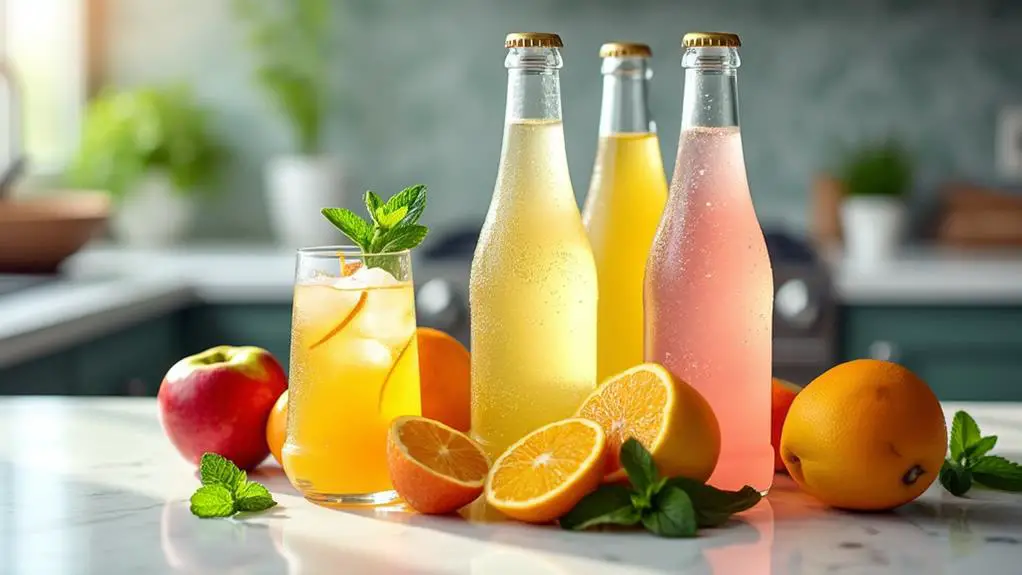
Sparkling water stands out as an ideal beverage choice for those adhering to a keto diet, due to its calorie-free and carb-free nature. This makes it an excellent alternative to sugary soft drinks, which can derail ketosis.
Popular sparkling water brands like La Croix and Perrier offer a variety of flavored sparkling options without added sugars, ensuring they remain keto-friendly. These beverages provide a rejuvenating, carbonated experience that can mimic the texture of soda, making them a satisfying substitute. Additionally, sparkling water can help reduce cravings and promote satiety, supporting overall well-being through nutrient-dense foods.
When selecting sparkling water, it is essential to check the label for any hidden sugars or carbs, especially in flavored varieties. Some brands may include sweeteners or additives that could impact your keto diet.
Opt for products that clearly state zero sugars and zero carbs to stay within dietary guidelines.
In addition to pre-flavored options, you can enhance the taste of plain sparkling water by adding a slice of lemon, lime, or fresh herbs such as mint. This method keeps the drink compliant with keto principles while offering a burst of natural flavor.
Benefits of Bone Broth
Benefits of Bone Broth
Bone broth is a nutrient-dense beverage that has gained popularity within the keto community for its numerous health benefits. With approximately 9 grams of protein per cup and no carbohydrates, it is an excellent addition to a keto diet. Here are three key bone broth benefits:
1. Joint Health and Inflammation: Bone broth is rich in collagen, a protein that supports joint health and may reduce inflammation throughout the body. This is particularly beneficial for individuals experiencing joint pain or stiffness, especially during intense physical activities.
Additionally, bone broth's high collagen content can also contribute to improving skin elasticity and overall appearance.
2. Essential Nutrients: It provides essential amino acids and minerals such as calcium, magnesium, and phosphorus, which are crucial for maintaining overall health. During the shift to a ketogenic diet, these nutrients help replenish what might be lacking, ensuring a balanced nutritional intake.
Furthermore, maintaining hydration and electrolyte balance through bone broth can alleviate symptoms of keto flu.
3. Gut Health: Bone broth promotes the growth of beneficial gut bacteria and strengthens the intestinal lining. This can improve digestion and enhance nutrient absorption, making it an important component for long-term gut health.
Additionally, the warm, comforting nature of bone broth can alleviate symptoms of the keto flu, such as fatigue and muscle cramps, by replenishing lost electrolytes.
Incorporating bone broth recipes into your diet can consequently be both a practical and health-boosting choice.
Keto Alcoholic Beverages

Keto Alcoholic Beverages
Steering through the world of keto alcoholic beverages requires careful selection to maintain ketosis while still enjoying a social drink. Dry wines, particularly red and white varieties, are a viable option for keto dieters, containing approximately 2 grams of net carbs per 5-ounce serving. Moderation is key to guarantee these carbs do not disrupt ketosis.
Additionally, low-carb food options like avocados and nuts can make great accompaniments to these drinks.
Pure spirits, such as vodka, tequila, rum, and whiskey, are excellent choices as they have zero carbs. However, caution is advised with flavored spirits, which often contain added sugars that can spike carb intake.
Low-carb hard seltzers have become increasingly popular, with many brands offering options that contain only 0-2 grams of carbs per serving. These can be an invigorating and keto-friendly choice.
For those who enjoy cocktails, it's possible to craft keto cocktails by using zero-carb mixers like soda water or diet soda. Avoiding sugary mixers is essential, as they can considerably increase carb counts and potentially knock you out of ketosis.
Lastly, it's vital to monitor alcohol consumption. Excessive intake can hinder ketosis and negatively impact weight loss efforts. Moderation and mindful selection can help maintain a balanced keto lifestyle.
Drinks to Avoid
When adhering to a keto diet, it is vital to avoid high-sugar beverages and carb-heavy dairy drinks.
For instance, sugary soft drinks like Coca-Cola and Mountain Dew contain 33 and 46 grams of sugar per 12-ounce serving, respectively, while fruit juices and sports drinks also carry significant carb loads that can disrupt ketosis.
It's also essential to be cautious with high-carb breakfast foods, which often include sugary drinks and mixers.
Additionally, indulgent coffee drinks and beer often have high carb content, making them unsuitable for maintaining ketosis.
High-Sugar Beverages
Avoiding high-sugar beverages is essential for anyone adhering to a ketogenic diet, as these drinks can greatly disrupt ketosis. Sugary soft drinks like Coca-Cola and Mountain Dew contain 33g and 46g of sugar per can, respectively, making them incompatible with a keto lifestyle.
Similarly, fruit juices, such as orange juice with 21g of sugar per cup, exceed the carbohydrate limits for keto dieters. Sports drinks like Gatorade also pose a threat, with a lemon-lime variant containing 29g of sugar.
To help maintain ketosis without sacrificing hydration, consider the following alternatives:
- Sugar-free soft drinks: Opt for beverages sweetened with sugar alternatives like stevia or erythritol.
- Infused water: Add slices of cucumber, mint, or lemon to water for a revitalizing, keto-friendly drink.
- Unsweetened tea or coffee: These can be flavored with keto-approved creamers or sugar alternatives.
High-sugar coffee drinks, such as lattes and frappuccinos, often contain added syrups that push them beyond acceptable carb limits.
Beer, with around 13g of carbs per can, should also be avoided or limited to low-carb options. Following these hydration tips helps guarantee your beverage choices support your keto goals effectively.
Carb-Heavy Dairy Drinks
Many common dairy drinks are laden with carbohydrates, making them unsuitable for a ketogenic diet. For example, an 8-ounce serving of dairy milk contains approximately 12 grams of carbs, which can considerably impact your daily carb limit on a keto regimen.
Flavored dairy drinks, such as chocolate or strawberry milk, are even more problematic, often exceeding 20 grams of carbs per serving due to added sugars. This level of carbohydrate intake can disrupt ketosis, the metabolic state crucial for a ketogenic diet.
Commercially available dairy-based smoothies and shakes also pose a challenge, as they frequently contain added sugars and carbs.
Even yogurt, particularly fruit-flavored varieties, can contain between 15 to 30 grams of carbs per serving. These options far surpass the daily carb allowance for keto dieters, making them detrimental to maintaining ketosis.
However, there are feasible dairy alternatives and low carb options. Unsweetened almond milk, coconut milk, and certain low-carb dairy products like plain Greek yogurt can serve as substitutes.
When selecting dairy products, always read labels carefully to avoid hidden sugars and confirm they fit within your carb limits. Making informed choices can help you stay on track with your ketogenic diet.
Best Keto Drink Choices
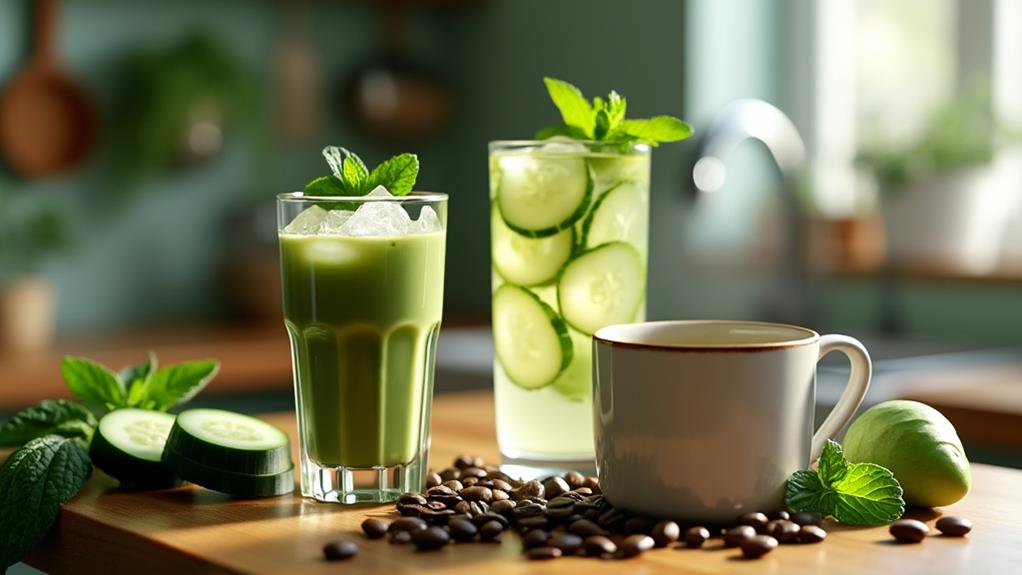
While adhering to the ketogenic diet, selecting the right beverages is essential for maintaining ketosis and overall well-being. To optimize your hydration and support your dietary goals, consider these keto drink recipes and hydration tips:
1. Water (Plain and Sparkling): Water is the cornerstone of any well-rounded diet, particularly on keto. It contains zero calories and carbs, making it perfect for hydration. For a twist, try sparkling water with a splash of lemon or lime.
Ensuring proper hydration can also help mitigate sleep disturbances often experienced during the initial phase of the keto diet.
2. Black Coffee: With less than 1 gram of carbs per cup, black coffee is a keto staple. Enhance it with heavy cream or MCT oil to boost its fat content without adding carbs, making it a satisfying and energizing drink.
3. Plain Tea: Green, black, and herbal teas are excellent keto-friendly choices with zero carbs. They also provide antioxidants that promote overall health. You can enjoy them hot or iced, and even add a dash of heavy cream for a richer texture.
Additionally, bone broth is a nutrient-dense option with about 9 grams of protein per cup and no carbs. It supports hydration and gut health, making it a valuable addition to your keto beverage arsenal.
Alcohol on Keto
In addition to selecting non-alcoholic beverages that align with your ketogenic goals, it's possible to enjoy alcoholic drinks without disrupting ketosis.
Pure spirits such as vodka, gin, tequila, and whiskey contain zero grams of carbs, making them excellent choices for keto cocktail recipes. By mixing these spirits with keto-friendly mixers like club soda or sugar-free tonic water, you can craft satisfying drinks that adhere to your diet.
It's also beneficial to prioritize high-quality fats when choosing mixers and accompaniments, as they can influence cholesterol levels positively on a keto diet.
Dry wines, both red and white, are another option, containing approximately 2 grams of net carbs per 5-ounce serving. This moderate carb content allows for occasional indulgence without greatly impacting your daily carb intake.
Low-carb hard seltzers, typically containing 0-2 grams of carbs per serving, can also be a revitalizing alternative. It is, however, important to check labels for any hidden sugars.
Beer, which is generally high in carbohydrates, can be problematic. Fortunately, low-carb options such as Michelob Ultra and Budweiser Select 55, with about 2-3 grams of net carbs per 12-ounce serving, offer a viable solution.
Carb Count of Popular Drinks
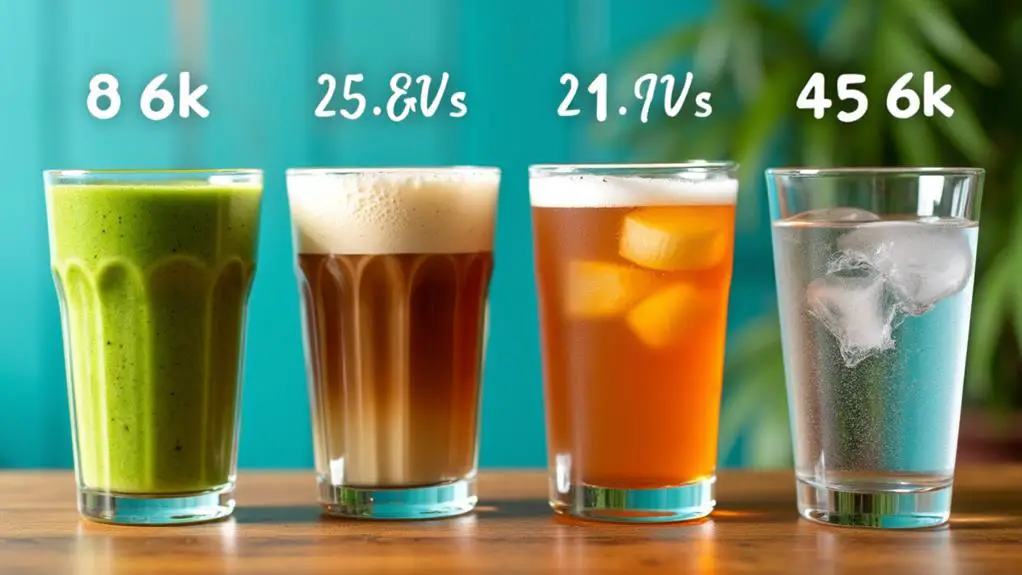
Understanding the carb count of popular drinks is essential for maintaining a ketogenic lifestyle, as even beverages can considerably impact your daily carb intake. While water, tea, and coffee are safe bets with 0 grams of carbs, many other drinks require careful consideration.
1. Low-Carb Options: Unsweetened almond milk, with approximately 2 grams of carbs per 8-ounce serving, offers a viable low-carb alternative to dairy milk.
Diet soft drinks also have 0 grams of carbs but may trigger cravings due to artificial sweeteners, necessitating cautious consumption.
2. Moderate-Carb Choices: Most wines, especially dry varieties, contain about 2-4 grams of carbs per 5-ounce serving.
This makes them permissible in moderate amounts for those following a keto diet, but mindful consumption is advised to stay within daily carb limits.
3. High-Carb Beverages: Standard fruit juices like orange juice, containing upwards of 21 grams of carbs per cup, are generally unsuitable for a ketogenic lifestyle.
Their high carb count can quickly derail your keto objectives.
Frequently Asked Questions
What Drinks Are OK on Keto Diet?
Acceptable drinks on a keto diet include water, black coffee, plain tea, bone broth, and unsweetened plant-based milks. Keto smoothies and low carb cocktails, such as vodka or gin with soda, are also suitable options.
What Fizzy Drinks Can I Have on Keto?
For keto, you can enjoy sparkling water and flavored seltzers with no added sugars. Brands like La Croix, Perrier, and Aura Bora offer zero-carb options, making them excellent choices for maintaining ketosis while enjoying fizzy drinks.
What Is the Best Keto Drink Besides Water?
Beyond water, the best keto drinks include unsweetened almond milk and herbal tea. Both options are low in carbs and offer additional health benefits; almond milk is ideal for smoothies, while herbal tea provides antioxidants.
Is Coke Zero Ok for Keto?
Coke Zero's keto compatibility is debated; while it contains zero carbs and calories, its artificial sweeteners, like aspartame, may trigger cravings and affect insulin levels. Moderation is key, and checking ingredient labels is essential.
Conclusion
Maintaining proper hydration is essential on a ketogenic diet. Water remains the best choice, while coffee and various teas offer suitable alternatives. Sparkling water provides a revitalizing option without compromising ketosis. Caution is advised with drinks high in sugars and carbohydrates, which can disrupt ketosis. Alcohol consumption should be limited and well-considered. Understanding the carbohydrate content in popular beverages aids in making informed decisions, ensuring adherence to ketogenic dietary guidelines.

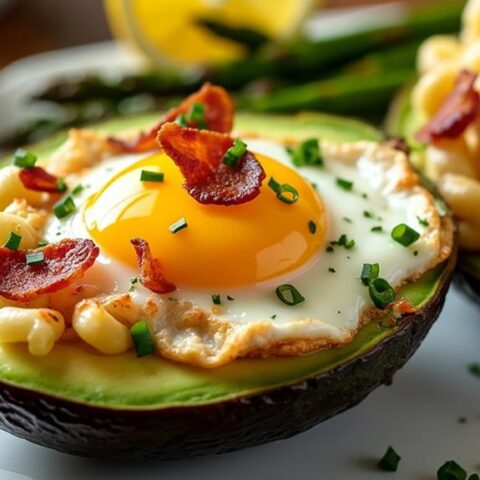
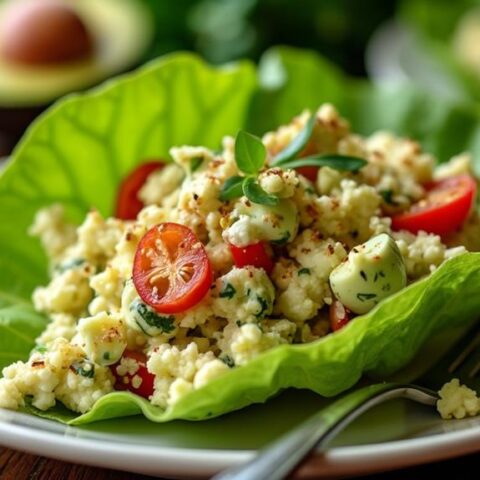
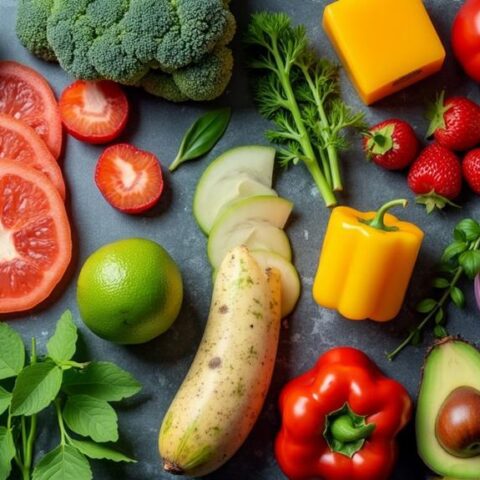
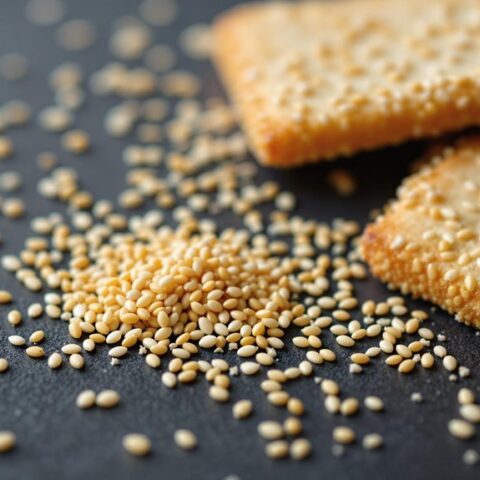
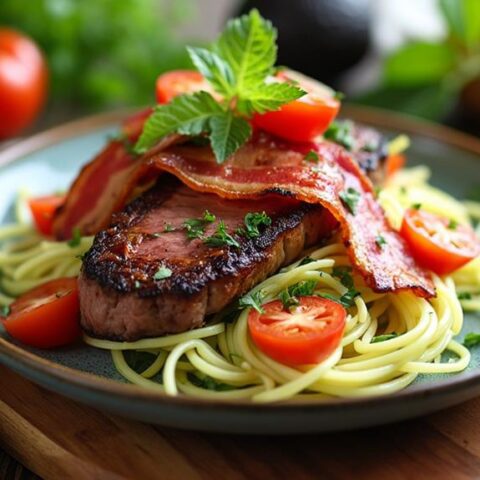




No Comments